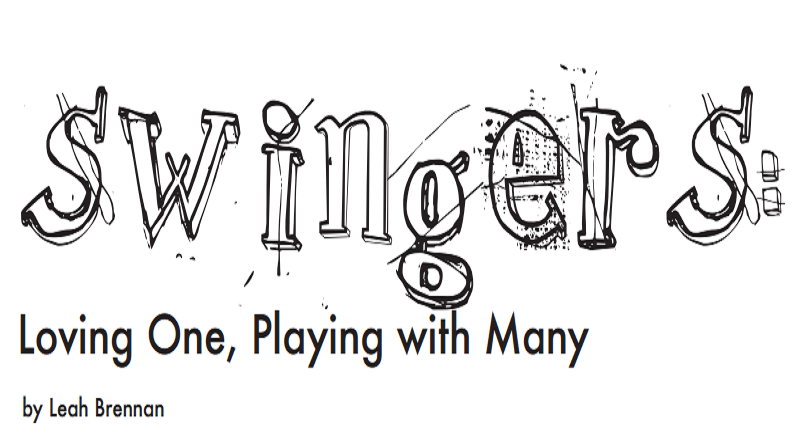Swingers: Loving One, Playing with Many

Article by Leah Brennan
Article originally featured in Intertext – A publication by Syracuse University, NY, United States.
Swingers are mothers, teachers, brownie leaders, and car salesmen. The thing that makes swingers unique is the very fact that they are ordinary people. They reside within a realm of a normal lifestyle. Sex, orgies, and bisexual encounters don’t define the couples in this subculture, marriage and parenthood do. Understandably, this claim is provocative, and it may be hard for non-swingers to comprehend, but swingers do have strong marriages; they just have an interesting choice of hobbies. These couples chose to take an unconventional path to lead them to a strong, dedicated, and ordinary marriage.
Swingers are a close knit group with their own definition of monogamy and family life as well as their own vocabulary. For example, many of the swingers I had contact with referred to themselves as part of the ‘lifestyle’ and their sexual escapades to be ‘play-time.’ Scholar Terry Gould also noticed the recurring use of these terms, and historicizes them to have been created in the 1980s by swingers who wanted to give validity and justice to the subculture of which they were a part (1). The negative connotations associated with “swinger” are derived from the belief that swingers participate in orgy-fests, are insecure, and that women are coerced in to this lifestyle. Swingers, in fact, are typically highly educated and have strong marriages (Gould 1).
Swingers have a complex relationship with mainstream culture. The sexual and emotional desires that they fulfil through swinging (though viewed as deviant by society) take place within the norms of middle class life, but the swinging subculture is still viewed as a threat because it challenges accepted views of matrimony and sexuality.
There is a popular saying in the lifestyle: “Swinging never made a bad marriage good” (Gould 7). As I began my research, I questioned why the majority of the couples were older (about forty years old). Swinging involves potential risks to marital stability, which is why it’s not for insecure or new couples; it requires trust. Young couples never fair well in the swinging world, because they are not secure enough in their relationships or with themselves to participate. I was able to conduct an email interview with Matt*, a swinger from the west coast who provided insight regarding young couples in the lifestyle, often referred to as “the beautiful people” since they are so young and there are so few of them. He has found that new couples are concerned with cheating and their relationship is just not stable enough. Frequently, play with these younger couples ends up being more troublesome for him and his wife to achieve: “also, new couples with whom you connect often crash and burn because of jealousy before you even get down to the play. It’s often better to avoid them and go for the experienced.” On a popular online swingers’ message board, swingers are able to communicate with each other. The board is often a place where swingers dismiss misconceptions about swinging that many nonswingers have. On one message board thread, a woman shared a story of a swinging date gone bad. Other swingers gave her advice. Again, they strongly emphasized the importance of communication: “although you both had fantasized about it many times, it doesn’t sound like you ever really talked about the what-if it happened, and what you would want to happen, and about what you’re comfortable with, therefore laying down some ground rules on what is okay and what isn’t” (Message Board Post).
- Name changed for individual’s anonymity.








